Related Research Articles

The First Intifada, also known as the First Palestinian Intifada, was a sustained series of non-violent protests, acts of civil disobedience and riots carried out by Palestinians in the Israeli-occupied Palestinian territories and Israel. It was motivated by collective Palestinian frustration over Israel's military occupation of the West Bank and the Gaza Strip as it approached a twenty-year mark, having begun in the wake of the 1967 Arab–Israeli War. The uprising lasted from December 1987 until the Madrid Conference of 1991, though some date its conclusion to 1993, the year the Oslo Accords were signed.

Nonviolence is the personal practice of not causing harm to others under any condition. It may come from the belief that hurting people, animals and/or the environment is unnecessary to achieve an outcome and it may refer to a general philosophy of abstention from violence. It may be based on moral, religious or spiritual principles, or the reasons for it may be strategic or pragmatic. Failure to distinguish between the two types of nonviolent approaches can lead to distortion in the concept's meaning and effectiveness, which can subsequently result in confusion among the audience. Although both principled and pragmatic nonviolent approaches preach for nonviolence, they may have distinct motives, goals, philosophies, and techniques. However, rather than debating the best practice between the two approaches, both can indicate alternative paths for those who do not want to use violence.

The Gandhi Peace Award is an award and cash prize presented annually since 1960 by Promoting Enduring Peace to individuals for "contributions made in the promotion of international peace and good will." It is named in honor of Mohandas Karamchand Gandhi, but has no personal connection to Mohandas Gandhi or his family.
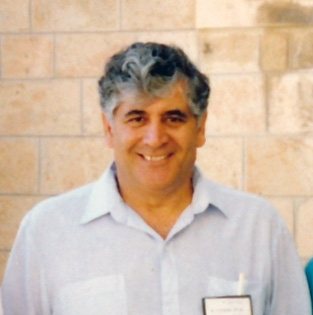
Mubarak Awad is a Palestinian-American psychologist and an advocate of nonviolent resistance.
Ghassan Andoni is a Palestinian activist.

Nonviolence International (NI) acts as a network of resource centers that promote the use of nonviolence and nonviolent resistance. They have maintained relationships with activists in a number of countries, with their most recent projects taking place in Palestine, Sudan and Ukraine. They partnered with International Center on Nonviolent Conflict to update Gene Sharp's seminal work on 198 methods of nonviolent action through a book publication. NI has also produced a comprehensive database of nonviolence tactics, which stands as the largest collection of nonviolent tactics in the world. They partner with Rutgers University to provide the largest collection of nonviolence training materials in the world.
Stephen Zunes is an American international relations scholar specializing in the Middle Eastern politics, U.S. foreign policy, and strategic nonviolent action. He is known internationally as a leading critic of United States policy in the Middle East, particularly under the George W. Bush administration, and an analyst of nonviolent civil insurrections against autocratic regimes.
Nafez Assaily, born in 1956 in the West Bank, in the Old City of Jerusalem grew up in Hebron, and is a sociologist and Palestinian peace activist. As early as 1997 he was defined as a Palestinian who had argued for a comprehensive strategy of non-violence through 43 years of the failure to achieve anything by armed struggle.

A peace movement is a social movement which seeks to achieve ideals such as the ending of a particular war or minimizing inter-human violence in a particular place or situation. They are often linked to the goal of achieving world peace. Some of the methods used to achieve these goals include advocacy of pacifism, nonviolent resistance, diplomacy, boycotts, peace camps, ethical consumerism, supporting anti-war political candidates, supporting legislation to remove profits from government contracts to the military–industrial complex, banning guns, creating tools for open government and transparency, direct democracy, supporting whistleblowers who expose war crimes or conspiracies to create wars, demonstrations, and political lobbying. The political cooperative is an example of an organization which seeks to merge all peace-movement and green organizations; they may have diverse goals, but have the common ideal of peace and humane sustainability. A concern of some peace activists is the challenge of attaining peace when those against peace often use violence as their means of communication and empowerment.

Nonviolent resistance, or nonviolent action, sometimes called civil resistance, is the practice of achieving goals such as social change through symbolic protests, civil disobedience, economic or political noncooperation, satyagraha, constructive program, or other methods, while refraining from violence and the threat of violence. This type of action highlights the desires of an individual or group that feels that something needs to change to improve the current condition of the resisting person or group.
Different Muslim movements through history had linked pacifism with Muslim theology. However, warfare has been an integral part of Islamic history both for the defense and the spread of the faith since the time of Muhammad.

Nonviolent Soldier of Islam is a biography of Khan Abdul Ghaffar Khan (1890-1988), an ally of Gandhi's in the Indian independence movement. Originally written by Eknath Easwaran in English, foreign editions have also been published in Arabic and several other languages. The book was originally published in the United States in 1984 as A Man to Match His Mountains: Badshah Khan, nonviolent soldier of Islam. A second edition was published in 1999 with the title Nonviolent soldier of Islam: Badshah Khan, a man to match his mountains. Both editions include an afterword by Timothy Flinders. The 1999 US edition contains a new foreword by Easwaran, and an enlarged section of photographs of Khan. The book has been reviewed in magazines, newspapers, and professional journals. The book inspired the making of the 2008 film The Frontier Gandhi: Badshah Khan, a Torch for Peace.
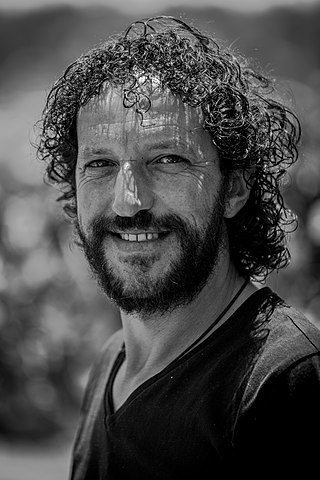
Ali Abu Awwad is a prominent Palestinian peace activist and proponent of nonviolence. He is the founder of Taghyeer (Change), a Palestinian national movement promoting nonviolence to achieve and guarantee a nonviolent solution to the conflict. Awwad's story and efforts have been featured in over twelve documentaries including two award-winning films, Encounter Point and Forbidden Childhood. Furthermore, he was honored by the global nonprofit thinktank Synergos as the Arab World Social Innovator in Palestine for "introducing non-violence, reconciliation, and civic participation to Palestinians as a means of empowering citizens to seek social change and find a more equitable solution to conflict." Awwad is currently finishing his memoir called Painful Hope, an account of his experiences as well as his strategy and vision for the Palestinian future. He lives in Beit Ummar, near Hebron.
Meta Peace Team (MPT), formerly Michigan Peace Team, is a nonprofit, grassroots organization founded in 1993 that seeks to pursue peace through active nonviolence and create an alternative to militarism through empowered peacemaking. MPT provides creative nonviolence training workshops to ordinary citizens with a framework of third party nonviolent intervention (TPNI), and it deploys peace teams to conflict areas both domestically and internationally. Its peace teams have worked in places such as Iraq, Haiti, Bosnia, Egypt, Panama, Mexico, Gaza Strip, and the West Bank; they have also been placed within the United States to create peaceful presences at national and state political conventions, Ku Klux Klan rallies, and gay pride parades, among many other events. MPT also works in collaboration with other peace and justice groups around the globe, including Nonviolent Peaceforce, Christian Peacemaker Teams, Veterans for Peace, the International Solidarity Movement, Peace Brigades International, the Shanti Sena Network, and the Metta Center for Nonviolence. Its current offices are located in Lansing and Detroit, Michigan. MPT is a founding member of the Shanti Sena Network.
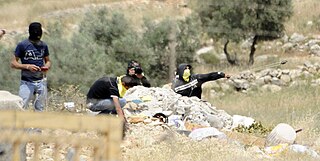
Palestinian stone-throwing refers to a Palestinian practice of throwing stones at people or property. It is a tactic with both a symbolic and military dimension when used against heavily-armed troops. Proponents, sympathizers, as well as some analysts have characterized stone throwing by Palestinians as a form of "limited", "restrained", "non-lethal" violence. Such stone-throwing can at times prove lethal: over a dozen Israelis, including women, children, and infants, have died as a result of stones being thrown at cars. Some Palestinians appear to regard it as symbolic and non-violent, given the disparity in power and equipment between the Israeli forces and the Palestinian stone-throwers. The state of Israel has passed laws to sentence throwers convicted of the charge to up to 10 years imprisonment even without proof of intent to harm. In some cases, Israelis have argued that it should be treated as a form of terrorism, or that, in terms of the psychology of those who hurl stones, even in defense or in protest, it is intrinsically aggressive.
United States Fellowship of Reconciliation was founded in 1915 by sixty-eight pacifists, including A. J. Muste, Jane Addams and Bishop Paul Jones, and claims to be the "largest, oldest interfaith peace and justice organization in the United States." Norman Thomas, at first skeptical of its program, joined in 1916 and would become the group's president. Its programs and projects involve domestic as well as international issues, and generally emphasize nonviolent alternatives to conflict and the rights of conscience. Unlike the U.K. movements, it is an interfaith body, though its historic roots are in Christianity. Both the FOR in the United States and similarly named organizations in other countries are affiliated with the International Fellowship of Reconciliation.
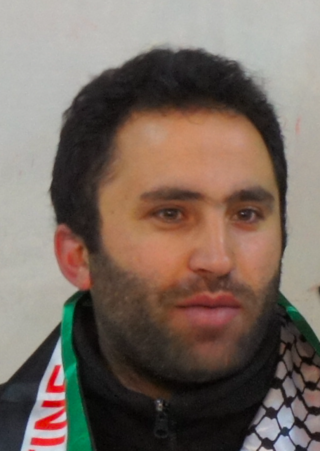
Issa Amro is a Palestinian activist based in Hebron, West Bank. He is the co-founder and former coordinator (2007–2018) of the grassroots group Youth Against Settlements. Amro advocates the use of nonviolent resistance and civil disobedience to fight the Israeli Occupation of the Palestinian Territories. In 2010, he was declared "human rights defender of the year in Palestine" by the Office of the United Nations High Commissioner for Human Rights In 2013, the United Nations Human Rights Council expressed concern for his wellbeing and safety due to numerous accounts of harassment from Israeli soldiers and settlers and a series of arbitrary arrests. At present, Amro is being indicted by the Israeli military court with 18 charges against him. In May 2017, Bernie Sanders along with three U.S. senators and 32 congressmen wrote to Secretary of State Rex Tillerson to urge Israeli authorities to reconsider the charges against Amro.
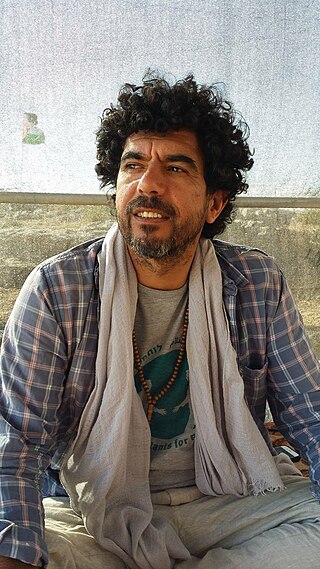
Sulaiman Khatib is co-director and co-founder of Combatants for Peace, a bi-national, grassroots nonviolence movement in Israel and Palestine. Combatants for Peace is dedicated to three main pillars: nonviolent direct action, joint partnership between Israelis and Palestinians and ending the Israeli military occupation. Khatib was nominated, along with Israeli co-founder of Combatants for Peace, Chen Alon, for the Nobel Peace Prize in 2017 and 2018. He has been compared in the press to a modern-day Gandhi, Martin Luther King Jr. or Nelson Mandela. He cites these three nonviolence leaders as his personal inspiration and the key to his transformation from violence to nonviolence.
References
- 1 2 Peter Ackerman; Jack DuVall (2001). A force more powerful: a century of nonviolent conflict. Palgrave Macmillan. p. 404. ISBN 978-0-312-24050-9 . Retrieved 9 May 2011.
- 1 2 3 Viorst, Milton (April 1988). Letter from Jerusalem. Faced with a growing sense of hopelessness. the Palestinians try a new approach. Mother Jones. pp. 21–23, 55. Retrieved 9 May 2011.
- 1 2 3 4 5 6 7 8 9 "Israel Forced Exile". TIME. 1988-06-27. Archived from the original on November 26, 2010. Retrieved 9 May 2011.
- 1 2 Catherine Ingram; Arun Gandhi (30 September 2003). In the footsteps of Gandhi: conversations with spiritual social activists. Parallax Press. p. 42. ISBN 978-1-888375-35-0 . Retrieved 9 May 2011.
- ↑ Amitabh Pal (3 March 2011). Islam Means Peace: Understanding the Muslim Principle of Nonviolence Today. ABC-CLIO. p. 184. ISBN 978-0-313-38290-1 . Retrieved 12 May 2011.
- ↑ Amitabh Pal (3 March 2011). Islam Means Peace: Understanding the Muslim Principle of Nonviolence Today. ABC-CLIO. pp. 179–193. ISBN 978-0-313-38290-1 . Retrieved 12 May 2011.
- ↑ Efrat, Dr Shlomo Riskin, Rabbi of. "MUBARAK AWAD: PACIFIST OR TERRORIST?". chicagotribune.com. Retrieved 2020-08-19.
{{cite web}}: CS1 maint: multiple names: authors list (link) - ↑ "THE REAL MUBARAK AWAD". Washington Post. ISSN 0190-8286 . Retrieved 2020-08-19.
- ↑ "Home :: Holy land Trust". www.holylandtrust.org. Archived from the original on September 27, 2011.
- ↑ Awad, Sami (19 September 2011). "What One Palestinian Learned From Gandhi". The Huffington Post.